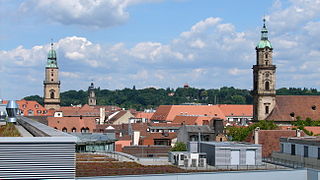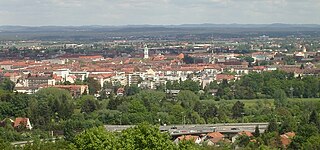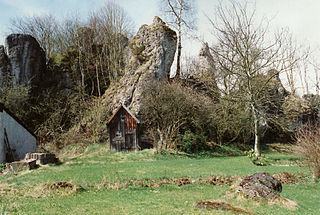
Erlangen is a Middle Franconian city in Bavaria, Germany. It is the seat of the administrative district Erlangen-Höchstadt, and with 113,758 inhabitants, it is the smallest of the eight major cities in Bavaria. The number of inhabitants exceeded the threshold of 100,000 in 1974, making Erlangen a major city.
Neustadt (Aisch)-Bad Windsheim is a Landkreis (district) in Bavaria, Germany. It is bounded by the districts of Würzburg, Kitzingen, Bamberg, Erlangen-Höchstadt, Fürth and Ansbach, and by the state of Baden-Württemberg.

Mattersburg is a town in Burgenland, Austria. It is the administrative center of the District of Mattersburg and was home to former Bundesliga football team, SV Mattersburg.

Fürth is a city in northern Bavaria, Germany, in the administrative division (Regierungsbezirk) of Middle Franconia. It is now contiguous with the larger city of Nuremberg, the centres of the two cities being only 7 km apart.

Neustadt an der Aisch is a small town of around 12,000 in the northern part of Bavaria (Germany), within the Franconian administrative region Middle Franconia. It is the district town of the district Neustadt (Aisch)-Bad Windsheim.

Neustadt an der Weinstraße is a town in Rhineland-Palatinate, Germany. With 54,000 inhabitants as of 2002, it is the largest town called Neustadt.

Neustadt am Main is a community in the Main-Spessart district in the Regierungsbezirk of Lower Franconia (Unterfranken) in Bavaria, Germany and a member of the Verwaltungsgemeinschaft Lohr am Main.

Dachsbach is a market town and municipality in the district of Neustadt (Aisch)-Bad Windsheim, in the administrative region of Middle Franconia in northern Bavaria in Germany.

Gerhardshofen is a municipality in the district of Neustadt (Aisch)-Bad Windsheim in the administrative region of Middle Franconia in northern Bavaria in Germany.

Hainsfarth is a municipality in the district of Donau-Ries in Bavaria in Germany.

Becherbach bei Kirn is an Ortsgemeinde – a municipality belonging to a Verbandsgemeinde, a kind of collective municipality – in the Bad Kreuznach district in Rhineland-Palatinate, Germany. It belongs to the Verbandsgemeinde Kirner Land, whose seat is in the town of Kirn. Becherbach bei Kirn should not be confused with Becherbach. Becherbach bei Kirn has borne the tag “bei Kirn” since 1 July 1969, at which time both municipalities found themselves in the same district as a result of administrative reform.

Hennweiler is an Ortsgemeinde – a municipality belonging to a Verbandsgemeinde, a kind of collective municipality – in the Bad Kreuznach district in Rhineland-Palatinate, Germany. It belongs to the Verbandsgemeinde Kirner Land, whose seat is in the town of Kirn.

Hottenbach is an Ortsgemeinde – a municipality belonging to a Verbandsgemeinde, a kind of collective municipality – in the Birkenfeld district in Rhineland-Palatinate, Germany. It belongs to the Verbandsgemeinde Herrstein-Rhaunen, whose seat is in Herrstein.

Herchweiler is an Ortsgemeinde – a municipality belonging to a Verbandsgemeinde, a kind of collective municipality – in the Kusel district in Rhineland-Palatinate, Germany. It belongs to the Verbandsgemeinde of Kusel-Altenglan, whose seat is in Kusel.

Dellmensingen Castle is an early Baroque castle in the Upper Swabian village of Dellmensingen, now part of the city of Erbach, in the state of Baden-Württemberg, Germany.

Tragelhöchstädt is a village in the municipality of Uehlfeld in the district of Neustadt (Aisch)-Bad Windsheim in Bavaria in Germany.

Leonrod is a village in the borough of the market town of Dietenhofen in the district of Ansbach, Middle Franconia, Germany.

Thuisbrunn Castle is located centrally within the parish of Thuisbrunn in the municipality of Gräfenberg in the Bavarian province of Upper Franconia. After having been destroyed and rebuilt several times, the castle is now in private ownership.

The burgstall or site of Bieberbach Castle is a ruined mediaeval spur castle at a elevation of 530 m above sea level (NN) on a rock formation in the southern part of the parish of Bieberbach, in the market municipality of Egloffstein in the county of Forchheim in the German state of Bavaria.

The burgstall of Unterailsfeld Castle is the site of a medieval lowland castle situated at a height of 360 m above sea level (NHN) in the village of Unterailsfeld, in the market municipality of Gößweinstein in the county of Forchheim in the south German state of Bavaria.






















